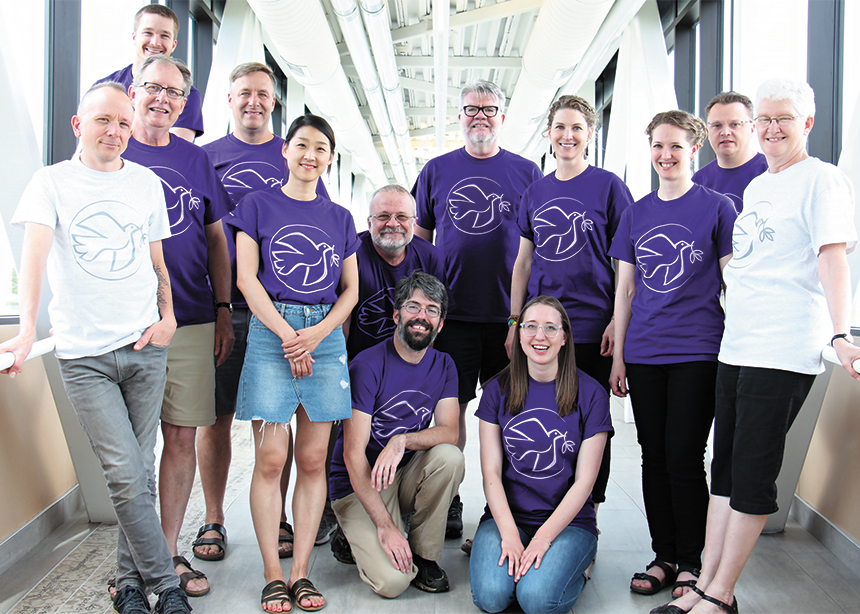At an Anglican church I know, the congregational response after the reading of Scripture is: “Listen to what the Spirit is saying to the church.” This response captures the dynamic nature of Scripture that respects the role of the Holy Spirit in our lives and in the lives of the many authors in the biblical canon. It inspires me to put my confidence in the timeless biblical drama reaching across millennia into our time and place.
What could the Holy Spirit be telling us in the gospel accounts about John the Baptist?
Two thousand years ago an apocalyptic preacher appears in the Judean wilderness. This wild man of the Bible preaches hellfire and brimstone, calling people to repentance and performing baptisms in the Jordan River. While he is true to his calling as the forerunner of Jesus, he expresses a fragmented understanding of the character of God, and a culturally conditioned grasp of Messiah and the Kingdom of God.
John the Baptist is an only child of an elderly couple who are well beyond childbearing age. While his father Zachariah is serving in the temple, an angel announces that they will have a child who will prepare the way for the long-awaited Messiah. His mother Elizabeth celebrates the significance of this reality when Mary, her cousin from Galilee, comes for a visit carrying the fetus of the promised Messiah. Their spontaneous expressions of joy express their excitement in anticipation of the fulfilment of God’s promised liberation. John’s parents hang on to the promise that their son John will be the warm-up act for God to physically intervene in world history.
Besides the Torah instruction most Jewish boys receive, John’s parents likely nurture him for his specific task. By the time John retreats into the Judean wilderness to lead a solitary life, his parents have died. We don’t know whether he chooses this lifestyle; whether he is exiled from his home community as an incurable eccentric; or whether he is discouraged and disillusioned, and is fleeing from a calling that makes him a social misfit. He lives a spartan lifestyle, clothes himself in simple attire, eats a meager diet and shelters in caves in the Judean wilderness. He looks like chaos. He predicts chaos.
By the time he is 30, John is a popular preacher railing against the evil that pervades Jewish life in his time. He preaches a God of judgment and vengeance. He calls people to repentance so they can escape the gathering calamity that is about to consume their world.
His harsh preaching resonates with people living under the oppressive rule of Rome. They live with a fading hope of liberation: oppressed, powerless and helpless. He scolds them: “Who have you come to see, a reed blowing in the wind?” Have they come to be enter- tained by the rantings of a madman or are they grasping for relief from their bleak life under occupation?
John’s message warns them of the imminent judgment day that will spare only the repentant. Sinners will be cast into unquenchable fire. John’s harangue is effective. People from all over Judea flock to hear him and be baptized. John reminds them that this baptism is limited in scope: for the remission of sins. He introduces a more all-encompassing baptism by the Spirit and fire that will accompany the arrival of the Messiah. John shakes people out of their lethargy and fans a glimmer of hope of redemption. In his dire message of tough love, he prepares the way for the dramatic change that God is setting in motion through the Incarnation.
As John the Baptist’s popularity grows, he rejects a celebrity status. It is the Messiah, not he, who will clean house. He describes the actions of the Messiah: “His winnowing fork is in his hand, and he will clear his threshing floor and will gather his wheat into the granary; but the chaff he will burn in unquenchable fire.” Like his followers, John the Baptist believes that the Messiah will liberate Israel from the Roman yoke and restore the house of David.
Even with the sign of a dove and the voice of God at the Jordan River confirming Jesus as the Messiah, John is baffled by the direction Jesus’ ministry is taking. What is all this gentle talk in the Sermon on the Mount? Loving your enemies does not sound like confronting the evil of occupation. Why is Jesus eating with sinners and associating with Samaritans, prostitutes and tax collectors?
No hint of a mass revolt against the occupation. Little talk of “winnowing the threshing floor” and casting the chaff into the “unquenchable fire.” John wonders if he is mistaken. How can he reconcile the incongruity of Jesus stopping for lunch with a tax collector, healing a centurion’s daughter and wasting time blessing children when there are Romans to drive from the land?
While in prison John sends his disciples to ask Jesus, “Are you the one who is to come, or should we expect someone else?”
Jesus answers: “Go back and report to John what you have seen and heard: The blind receive sight, the lame walk, those who have leprosy are cleansed, the deaf hear, the dead are raised, and the good news is proclaimed to the poor. Blessed is anyone who does not stumble on account of me.”
We don’t know how John responded to this report before his tragic death on the whim of Herod.
John lives up to his calling by using graphic language to get the main message through to his listeners. He shocks people out of the paralysis of their dehumanizing reality. He prepares them for the liberation the Messiah brings, despite John’s incomplete understanding of the character of God or the nature of the Kingdom of God.
What are we hearing?
Could it be that the Spirit is drawing us into the unfolding of this very human story with its limitations and contradictions, but also its potential for mindfulness, enlightened passion, humble devotion and spiritual enlightenment? How do our encounters with faith mirror those in the story of John the Baptist?
The Spirit reminds us that, like the disciples’ recollection of those events, our fragmented memories nevertheless retain the central truth of our faith: God incarnate in Jesus entered into history. God incarnate comes as truth and love, bringing salvation and the fullness of life through the life, death and resurrection of Jesus, radiating through time to inspire lives of devotion and faith in our day.
The Spirit reminds us that, like the insecure people flocking to the Jordan River to hear John, we, too, experience what feels like the silence of God. We tell stories of our persecuted ancestors, and we see the poverty and illness around us today. Does God hear those crying for healing, justice and liberation? We want to believe that God does, but we can’t always see clear evidence of that caring. How can we be jolted out of our paralyzing doubts to bolster our faith?
The Spirit reminds us that, like members of the religious elite, we often approach Jesus’ claims with caution. What will it cost to follow the leading of the Spirit? Are we willing to make the sacrifice that it demands? How will following Jesus affect our comfortable lifestyle, our friends, our social status and our careers? Like the powerful ones who came to check John out, we tend to guard what we have achieved and assume we are entitled by our efforts and status. It is hard to let go, to base our lives on the word of a Messiah who threatens to upset the security we have so carefully crafted.
The Spirit reminds us that, like John the Baptist, we, too, have experienced the wilderness of an identity crisis—rejection, isolation, insecurity and depression—with no obvious way forward. We too often consider John’s emphasis on hellfire and brimstone as a remedy for the lawlessness around us.
However, our inclination for judgment and violence is tempered by glimpses of the unfolding of the Kingdom of God with its striking evidence of the gentle and nonviolent Spirit at work in the lives of people and communities. The Spirit draws us deeper into the mystery of God. Jesus reminds us that God’s judgment is about justice and the consequences of willful evil. God’s central message is reconciliation, love and forgiveness.
The Spirit reminds us that we should not take ourselves too seriously. Like John, we recognize our brokenness, and we humbly respond to the grace and mercy of God. We see ourselves as privileged to participate as extras in the unfolding of God’s actions in our day.
Like John the Baptist, we sometimes experience a clear calling. Our Christian calling is not exclusively to specific tasks, but to a state of being that responds to opportunities that present themselves as we live in community, opportunities created by the social and geo-political realities we live in, including the church family.
Listening to what the Spirit is saying in the story of John the Baptist leads us individually and collectively to sober introspection, greater transparency, an authentic identity, effective messaging, genuine humility, resurgent hope and an inclusive kingdom theology. In our words and deeds, we create the safe and inviting conditions in which people are drawn into a living relationship with God and God’s people, where they are nurtured into a mature faith.
The lesson we can take from John the Baptist is: “Listen to what the Spirit is saying to the church.” Let us expect the Word to come alive in us today.
Johann Funk is a retired associate professor of sociology, a former executive secretary of Native Ministries and a Community Peacemaker Teams reservist. The sermon was delivered at Point Grey Inter-Mennonite Fellowship in Vancouver on March 13.
—Corrected Nov. 14, 2022. This article originally omitted the full name of Johann Funk’s church and misidentified the date the sermon was delivered.
For discussion
1. Who are some examples of biblical characters who heard the voice of the Holy Spirit? How did they respond? How well did they understand the implications of the message? Have you ever felt that the Spirit of God was speaking directly to you? When God speaks to us, how confident should we be that we understand what God is saying?
2. Johann Funk describes John the Baptist as “preaching a God of judgment and vengeance” with a message of “tough love.” Does this fit with your perception of John the Baptist? Why do you think John sent a message to Jesus, asking if Jesus was the Messiah? How do you think John responded to Jesus’ return message?
3. Funk writes that “we, too, experience what feels like the silence of God.” What are the situations in your life where you have longed for God to intervene to bring healing and justice? How much do you struggle with doubt that God cares about these situations?
4. “We too often consider John’s emphasis on hellfire and brimstone as a remedy for the lawlessness around us,” writes Funk. Do you agree? What are Spirit-led alternative responses to evil in our world?
5. Where have you seen glimpses of reconciliation, love and forgiveness that give you hope?
—By Barb Draper









Leave a Reply
You must be logged in to post a comment.